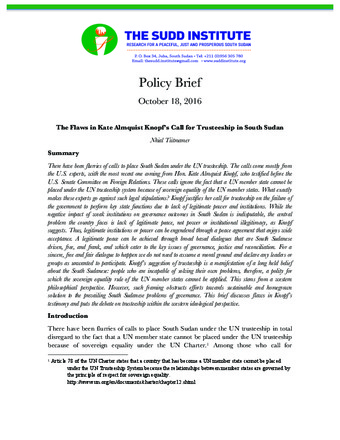The Flaws in Kate Almquist Knopf’s Call for Trusteeship in South Sudan
Publication Summary
There have been flurries of calls to place South Sudan under the UN trusteeship. The calls come mostly from the U.S. experts, with the most recent one coming from Hon. Kate Almquist Knopf, who testified before the U.S. Senate Committee on Foreign Relations. These calls ignore the fact that a UN member state cannot be placed under the UN trusteeship system because of sovereign equality of the UN member states. What exactly makes these experts go against such legal stipulations? Knopf justifies her call for trusteeship on the failure of the government to perform key state functions due to lack of legitimate power and institutions. While the negative impact of weak institutions on governance outcomes in South Sudan is indisputable, the central problem the country faces is lack of legitimate peace, not power or institutional illegitimacy, as Knopf suggests. Thus, legitimate institutions or power can be engendered through a peace agreement that enjoys wide acceptance. A legitimate peace can be achieved through broad based dialogues that are South Sudanese driven, free, and frank, and which cater to the key issues of governance, justice and reconciliation. For a sincere, free and fair dialogue to happen we do not need to assume a moral ground and declare any leaders or groups as unwanted to participate. Knopf’s suggestion of trusteeship is a manifestation of a long held belief about the South Sudanese: people who are incapable of solving their own problems, therefore, a polity for which the sovereign equality rule of the UN member states cannot be applied. This stems from a western philosophical perspective. However, such framing obstructs efforts towards sustainable and homegrown solution to the prevailing South Sudanese problems of governance. This brief discusses flaws in Knopf’s testimony and puts the debate on trusteeship within the western ideological perspective.
Nhial Tiitmamer has served as the Director of the Environment and Natural Resources Program at The Sudd Institute where he is currently on leave to work with United Nations in South Sudan (UNMISS). He has served as an Adjunct Assistant Professor at the University of Juba where he has taught Environmental Economics, Natural Resources Economics and Environmental Sociology. Between November 2021 and November 2022, Nhial worked as Senior Environment Associate with the United Nations High Commissioner for Refugees (UNHCR) in Juba. Before returning from Canada in 2013, Nhial worked at Arletta Environmental Consulting in Calgary and at University of Alberta’s Augustana Campus in Camrose in Alberta, Canada. Nhial’s research focusses on natural resources governance, environmental protection, climate change, and sustainable energy. He was awarded in May 2023 by the Board of Directors of The Sudd Institute with Research Impact Award for policy impacts. Nhial holds a B.A. in Environmental Studies with a minor in English Literature from the University of Alberta and an M.Sc. in Sustainable Energy Development from the University of Calgary in Alberta, Canada.

